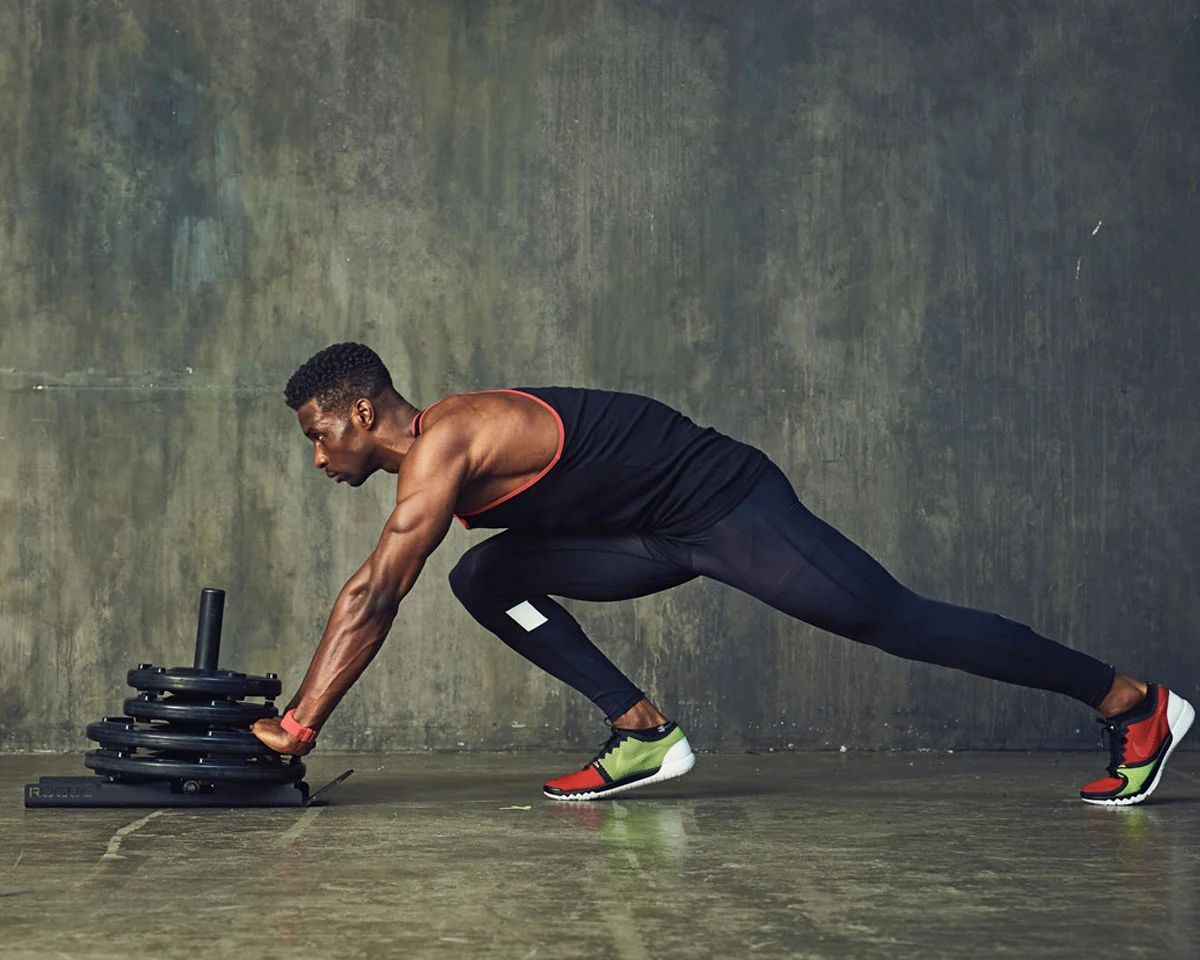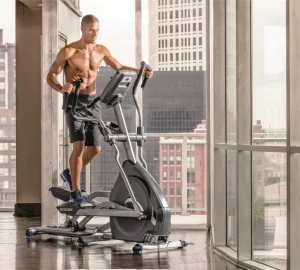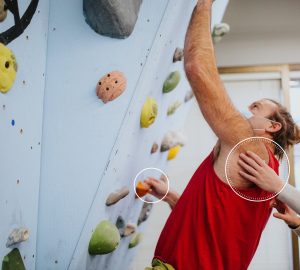This is a common question among both lifters and athletes. Can you train for both body building and athletics simultaneously? Well, the short answer is yes. You can train for aesthetics and athletics simultaneously; however, there’s a caveat.
Although you can train for both, it’s far from optimal, as you will never reach your full potential in either field.
You will have to be ok with a certain level of compromise, and your fatigue management must be superb. The amount of compromise will also be very sport dependent. For example, if you’re a football player, you may experience almost no compromise, as muscle and strength training are essential parts of the sport.
However, on the other hand, if you play cardio-intensive athletics such as basketball or soccer, well, you better pray to god that you have some half-decent muscle-building genetics, as these sports are like muscle-building kryptonite.
God help you if you run cross country, as at least the other 2 sports were fast twitch-based. Now for those of you who are football players, if your coach is somewhat competent, just listen to him, and you should be on your way to an intermediate lifters physique in no time.
However, if you’re not a football player, well, start taking notes as I walk you through the mess that is trying to build muscle as an active athlete.
How To Bodybuild As An Athlete
Alright, so if you’re a current athletics athlete reading this, you are either in 1 of the 3 scenarios.
- You’re in your off-season (Best case scenario)
- You’re in your pre-season (Still doable)
- You’re in season (Death wish)
I will go over an action plan for each of the 3 scenarios, starting from the top. *Note these scenarios will mainly apply to high school athletes. Sorry to any collegiate or professional athletes reading this.
Off-Season
You lucky son of a gun. If you fall under this category, pat yourself on the back, as this is the perfect time to make some gains. The length of your off-season will vary from sport to sport.
If you’re looking to maximize your gains, now is the time. Put your sport on the back burner, as you will want to prioritize bodybuilding at this time. 75% of your training should be dedicated to muscle building, while the other 25% will be allotted to sports-specific skills training and cardio.
Also, try to compete just once a week to keep yourself sharp. I recommend a 4-day-a-week upper-lower split.
Suppose you really need to work on certain aspects of your athletics game, especially in high-skill sports like basketball and soccer. In that case, you can opt for a 3-day-a-week full body and do more of a 65%, 35% split, but just remember the off-season will be the best time to make gains and the only time you will be able to go all out in the weight room.
Here’s a workout plan you could try to follow; feel free to modify it to fit your personal needs.
Off-Season Training Plan:
- Monday. Skills training 30 minutes in the am. Upper Body lift in the pm.
- Tuesday. Light-moderate cardio 15 minutes in the am. Lower Body lift in the pm.
- Wednesday. Skills training 20 minutes am. Recovery, flexibility and mobility in the pm.
- Thursday. Light-moderate cardio 15 minutes am.Upper Body lift pm.
- Friday recovery, mobility, flexibility am. Lower Body lift pm.
- Saturday. Compete 45mins-1.5 hr.
- Sunday rest. Optional recovery, flexibility, and mobility.
Also, make sure you’re eating in a heavy caloric surplus. Try to get as bulky and big as possible. Just don’t spill over; try to stay within a limit of 20-22% body fat. Yes, you’re allowed to go over the 20% mark. Trust me, by the end of the season, you’ll be within striking distance of 12%, no matter how hard you try to maintain your weight.
The closer you get to pre-season, the more you should up the cardio, and skills training, as to get into better shape and to cut some excess fat you may have. Don’t do too much cardio however, as until athletics pre-season officially starts, you should just focus on building as much muscle as possible.
You must be mentally ok with knowing that the coach will absolutely kick your ass during the preseason workouts.
That’s ok, though, as that’s what pre-season training is for.
Pre-Season
Alright, now you’re in the pre-season. Hopefully, you made some good gains in the off-season because the gains will only get slower from here. If you’re one of the readers who fell into the pre-season category, well, this isn’t the worst scenario, but it’s definitely far from ideal.
You have 1 to maybe 3 months to make your gains. Now, if your team is somewhat competent, your coach will be trying his damnedest to kick your ass into gear, which basically translates to obscene amounts of cardio.
A quick word of advice, you will be doing no cardio outside of athletics practice from here on out. Your efforts outside of practice should be solely dedicated to building muscle and strength, working on your skills, and occasionally competing if you play a team sport.
You must prioritize recovery, eat in a calorie surplus, and have a tremendous micronutrient intake. If you’re a quote-on-quote hard gainer, you may be more concerned with maintaining your gains than making new ones.
If you have half-decent genetics, you could probably still squeeze out a few more pounds of muscle.
You might be able to pull off a 4-day-a-week upper-lower split if you have exceptional recovery and durability; however, for the majority of you a 3 day a week full-body workout split will be your best option from here on out. Here’s a schedule you can follow. Feel free to modify it to better fit your own personal needs.
For this example, let’s say you have 3 team practices a week.
Pre-season Training Plan:
- Monday Team Practice.
- Tuesday Lift. Recovery, mobility, flexibility.
- Wednesday Team Practice.
- Thursday Lift. Recovery, mobility, flexibility.
- Friday Team Practice.
- Saturday Lift. Recovery, mobility, flexibility.
- Sunday Rest. Recovery, mobility, flexibility.
Hopefully, you won’t ever have to lift and practice on the same day until you’re in season. I mean- the only thing worse than a leg day, is having to do a leg day after a 3-hour basketball conditioning-focused practice.
Try getting into that squat rack after running 35 suicides, not fun.
If you’re really struggling in the skills and cardio department try to get in a morning or night session with light to moderate skill work, or cardio 2-4 times per week.
These athletics sessions should last a maximum of 30-45 minutes. For the most part, you should just be going 100% in all of your team conditioning and skill workouts. If you think your gonna have a big year this year and potentially be scholarship worthy(be realistic), feel free to go hard with the extra skill, and cardio work.
Just make sure you don’t blow your load early and have nothing left to give during the season, you know the thing that actually matters.
Things will only get tougher from here on out, and fatigue management will become essential as you head into your season.
In Season
Welcome to hell, or should I say welcome to being an in-season body-building student-athletics. It’s very common to become fatigued, overtrained, and injured during this time. I hope you came into your season with some gains because you won’t be making any here.
If you’re one of the unlucky souls who will be reading this at the start of their season, well, I’m here to tell you that you’d be better off just waiting for the off-season to begin.
Unless you’re willing to go all in on bodybuilding and just half-ass your sport in the name of gains and ride the bench the whole year, you’ll just be lucky to maintain any muscle you already have on your frame.
Unless you are very genetically gifted, you will not be making any gains. This will be a hard 3-5 months; there’s a good chance that you will lose some size and strength, but hey, at least you’ll be lean and shredded by season’s end.
You must, and I cannot stress this enough, but you must be eating in a caloric surplus if you want to survive. Your recovery must be on point, with a high micronutrient intake and 9-11 hours of sleep. You should even consider supplementing with zinc, vitamin D, and magnesium as well.
Caffeine will be your best friend here; if you start feeling burnt out and notice a significant dip in physical performance, take a couple of days off, even if that means skipping practice.
If you try to push through burnout, you’ll literally die. Ask me how I know that. Stress and fatigue will become a problem at some point, no matter how well you manage them in the beginning. And if you’re not at least one of the top 6 guys on your athletics roster, just quit and go make some gains.
Here’s a schedule you can follow that may help you keep some form of sanity. For this example, let’s say you have 4 practices a week and one event/game.
In-Season Training Plan:
- Monday Practice. Lift.
- Tuesday Practice
- Wednesday Lift. Recovery, mobility, flexibility.
- Thursday Practice.
- Friday Practice. Lift.
- Saturday. Event/Gameday. Recovery, mobility, flexibility.
- Sunday Rest. Recovery, mobility, flexibility.
Obviously, this schedule is only best case scenario; you’re going to have to be able to adjust and adapt, but hopefully, you already knew that. Don’t expect to make much progress during this time.
This schedule won’t be fun. You will have no room for a social life, you can kiss your girlfriend goodbye, and you’ll essentially be living like a monk for the next 3-5 months.
Conclusion
Well, you’re either feeling really self-assured right now, enjoying some sweet, sweet gains, or you’re reconsidering your entire life right now. Don’t worry; I was in your exact same situation not even a year ago.
I was a basketball player trying to build muscle, and you know what I did? Like a good bro, I quit my sport and chose gains. See, sometimes in life, you have to make a choice, and I decided that walking around with the body of a greek god was better than sitting on the bench with my coaches nuts in my face.
See, you are probably not 50/50 on both lifting and sports. You most likely like one more than the other. I would recommend just choosing the one you enjoy the most. And for those of you who are truly 50/50, well it can be done, if, and only if you have above-average genetics.
Truth hurts, but well for those of you who aren’t iron men, you’ll most likely just end up a burnt-out injured husk.
So to answer your question, yes, technically, you can train for both athletics and bodybuilding, but in all reality, you should just pick one or the other.
Author Bio:
Hi, my name is Jayden Pollard. I am a passionate power builder, who has recently entered the world of online health and fitness writing. I run the fitness blog, SHREDDIT, and have a vast background in strength training, and athletics.









